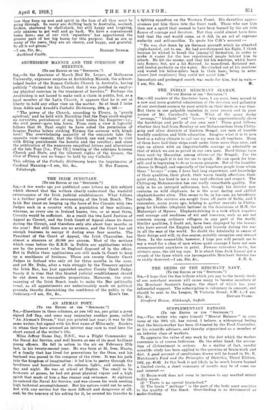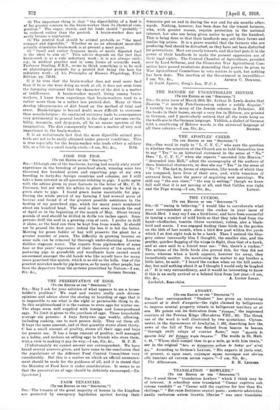SUPPLEMENTARY RATIONS.
(To TM EDITOR or TM " SPECTATOR.") Sia„—The writer who signs himself "Mental Balance" in your issue of the 30th ult, has voiced, I believe, a widespread feeling that the brain-worker has been ill-treated by the Food Controller, or his scientific advisers, and thereby stigmatized as a member of an inferior class of workers.
To appraise the value of any work by the diet which the worker consumes is of course ludicrous. On the other hand, the accusa-
tion of ill-treatment is serious. As a matter of fact, careful scientific study has been applied to the question of brain-work and diet. A good account of conclusions drawn will be found in Dr. R. Hutehison's Food and the Principles of Dietetics, Third Edition, hill, pp. 41-42. As this book is not likely to be much known beyond a limited circle, a short summary of results may be of some use and interest :—
(1) Brain-work does not seem to increase to any marked extent bodily waste.
(2) "There is no special brain-food."
(3) The brain " perhaps" is the part of the body most sensitive to the quality of the blood. Over-feeding is as detrimental as wider-feeding. (4) The important thing is that "the digestibility of a food is of far greater concern to the brain-worker than its chemical com- position." The sugar, starch, and fat foods should " probably " be reducod rather than the proteid. A brain-worker does not easily become a vegetarian. (5) The proteid food should be animal proteids as "the most compact and digestible." Whether or no an abundant meat-diet actually stimulates brain-work is at present a moot point.
(6) "Small and rather frequent meals of easily digested food is the ideal to aim at." This advice depends on the fact that brain-work is as a rule sedentary work : it is not always such; e.g., in medical practice and in some forms of scientific work. Professor Starling, F.R.S., seems to think something is to be said on physiological grounds for a proteid diet being the best for sedentary work : d. his Principles of Human Physiology, First Edition, pp. 733-31.
If it be true that the brain-worker does not need more food than if he or she were doing no work at all, it does not seem from the foregoing statement that the character of the diet is a matter of indifference. A brain-worker myself, living among brain- workers, I know from experience that brain-workers tend to a rather more than to a rather less proteid diet. Many of them develop idiosyncrasies of diet based on the method of trial and error. Brain-fatigue is beyond doubt more difficult to overcome than muscle-fatigue : its continued existence leads to consequences very detrimental to general health in the shape of nervous excita- bility, insomnia, and dyspepsia, all by no means spectres of the imagination. The diet consequently becomes a matter of very real importance to the brain-worker.
It is an unfortunate fact that the more digestible animal pro feeds are not to be easily obtained under present conditions. This is true especially for the brain-worker who leads either a solitary life, or a life in a small family circle.—I am, Sir, &c., D.Sc.



























 Previous page
Previous page